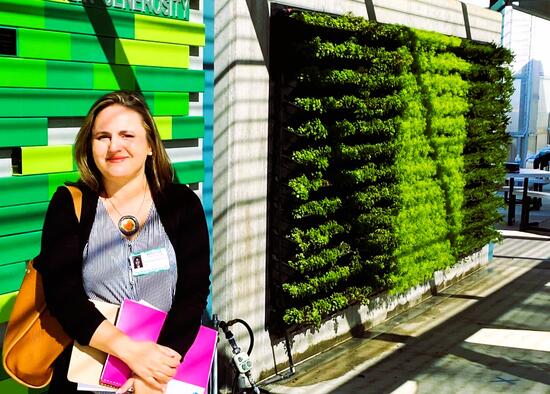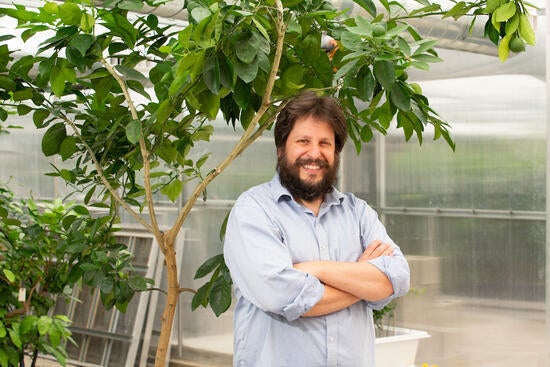Riverside, California, USA
October 25, 2024
he University of California, Riverside, has been awarded $1.5 million in grants from the California Department of Food and Agriculture to lead three interconnected projects aimed at transforming California’s specialty crop farming. The initiatives focus on youth engagement, sustainable waste management, and advanced agricultural technologies.
 Deborah Pagliaccia.
Deborah Pagliaccia.
“These multidisciplinary projects are designed to address complex food system challenges by integrating diverse perspectives,” said Deborah Pagliaccia, a professional researcher in the UCR Department of Microbiology and Plant Pathology and co-principal investigator of the grants. “They aim to foster a learning environment where students and stakeholders contribute to a cohesive curriculum that bridges the gap between theoretical knowledge and practical application.”
Each of the three projects has received about $498,000 in funding and will integrate education, research, and practical application to help shape a sustainable future for global food systems.
“We are also committed to equipping and informing students with the knowledge and skills necessary for careers in agriculture,” said Georgios Vidalakis, a professor of plant pathology and director of the UCR Citrus Cloning Protection Program, who is the grants’ principal investigator. “We will use a holistic teaching approach to enhance academic and professional development and prepare students to continue their education or enter the job market as effective change agents.”
The first project is titled “Seeding Success: Youth Engagement and Skill Development for Sustainable and Resilient Specialty Crop Farming in California.” Led by UCR in collaboration with UC Agriculture and Natural Resources, the Growing Hope Project, John W. North High School, and San Andreas High School, the project aims to cultivate a skilled, diverse, and adaptive workforce prepared to meet emerging climate and socio-economic challenges in California's specialty crop sector.
 Georgios Vidalakis.
Georgios Vidalakis.
A key component is the development of a new course, “Sustainable Agri-Food Systems and Circular Economy,” which is designed to educate, engage, and empower high school and UCR undergraduate students to address global food security and environmental sustainability challenges. Students will participate in workshops, labs, field visits, and internships that offer them practical experience in sustainable farming technologies such as controlled environments, insect-based farming, climate-smart agriculture, and nature-based farming.
The second project is titled “Closing the Loop: Transforming Agri-Food Waste into Sustainable Carbon-Based Soil Amendments and Fertilizers.” Researchers will address climate change, improve soil health, promote sustainability, and enhance carbon sequestration practices. Specifically, they will divert waste from landfills, reduce greenhouse gas emissions, and lower reliance on synthetic fertilizers. They will also transform agri-food waste into valuable soil amendments, research the impacts of organic waste-based soil amendments on field-grown trees and greenhouse-grown vegetables, engage underserved farmers, and create internships for UCR students.
The third project is titled “Sustainable Citrus: Unlocking the Potential of Controlled Environment Agriculture for Commercial Nursery Growers.” With the goal of translating scientific discoveries into practical solutions for commercial growers, the project will enhance controlled environment agriculture technologies for citrus nursery growers. Researchers will focus on optimizing light conditions to improve plant growth and stress resilience while also enhancing the quality of disease-free plants and improving energy and cost efficiencies. Researchers will train underserved farmers and offer internships to UCR students to give them hands-on experience in advanced agri-food systems technologies.
All three projects, which begin November 1, 2024, and end June 30, 2027, will be interconnected through their use of labtofarm.org, a platform dedicated to bridging the gap between laboratory research and practical farming applications. The platform will allow researchers to disseminate their findings, engage with a broader community, and develop sustainable methodologies that are economically viable and environmentally friendly.
“LabtoFarm.org will allow us to engage undergraduate students, underserved farmers, and various stakeholders in a meaningful exchange of knowledge and innovation,” Pagliaccia said. "The platform also serves as a hub for student internships and collaborative projects, offering valuable opportunities for professional growth, hands-on experience, and direct involvement in sustainable agri-food systems practices."
According to Vidalakis, UCR is well positioned to conduct the three projects because of its location.
“We are one of very few universities conducting agricultural research that are located in urban environments,” he said. “Ours gives us access to more young minds that we can train to become business owners, entrepreneurs, and government officials. Traditionally, large urban centers have been generators of research, development, and new technologies and ideas.”
Pagliaccia, who has extensive expertise in sustainable agri-food systems, said the idea for the three projects was conceived during her service as managing director of UCR’s California Agriculture and Food Enterprise, or CAFÉ.
“In CAFÉ, we worked to empower the community to make well-considered decisions toward a sustainable and economically successful future for global agri-food systems, which is also the overall goal of our three projects,” she said.
Pagliaccia and Vidalakis will be joined in the projects by co-principal investigators Samantha Ying, Robert Jinkerson, Sohrab Bodaghi, and Arunabha Mitra at UCR; and Jonathan Kaplan at Sacramento State University.